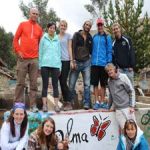
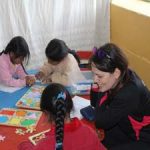
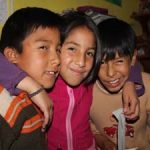
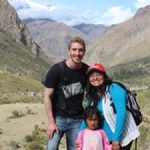
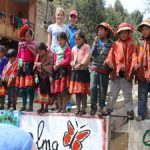 ScotiaMcLeod Employees Visit Alma Projects in Peru and Bolivia
ScotiaMcLeod Employees Visit Alma Projects in Peru and Bolivia
On October 10, for the third consecutive year, a group of Alma supporters (and two of their children) travelled at their own expense to Peru and Bolivia to visit our projects. The following is a very brief summary of their trip. See the “Projects” page of the website for more information and photos.
Upon arrival in Cusco we were given no time to shake off jet lag or to acclimatize to the altitude – we went straight to Suyacuyhuan Yachasun, a small facility that provides computer, cosmetology, and secretarial skills to girls from two orphanages and an “at-risk” centre (girls rescued from forced prostitution, abuse, and/or domestic slavery) near by. The centre will be opening in the next few weeks, so we attended a traditional Andean blessing ceremony, together with Carmen Munoz, the director, and some of the girls who will be attending, but who did not know this at the time. When Carmen explained to the girls that they would be receiving training and government endorsed graduation certificates, they were overcome with emotion. And then we were, too.
We visited the orphanages and the “at-risk” centre then moved on to a very poor area of town where, amongst all the social and economic challenges, sits a wonderful beacon of light: our Biblioteca Kallpanchis project. This stone bunker is divided by curtains into three rooms, each with a large wooden table. It is staffed by three trained teachers and provides “homework” help to any children in the barrio who want more than the poor education they are receiving at school. Some 30 to 40 children attend every day but my lasting memory was coloring with Marleny a sweet grade two student.
Next it was on to Mosaq Runa, a home in Urubamba for at-risk children run by Ada Stevanja, a force of nature whom I have known for four years. Alma is providing a teacher to help the children with their schoolwork. The kids wanted to play with us, so Tiana and Noah, the two teen-agers in our group, knitted (with Mary Luz and the younger girls), made paper airplanes, played soccer, and ran around and around until they could no longer stand up.
On our second day we visited Kiya Survivors, a facility for children with special needs that we have been supporting for three years. Every year the place looks better, and the opportunities offered to these children expand. I have known some of the kids (Katia, Lourdes and the Lifeskills kids)for three years now, so it’s encouraging to see them grow up in a place of love and inclusion.
Then we undertook the long trek along the Inca trail to Chamana. We spoke with several mothers, the teachers, and many of the children about our nutrition project. They told us that they were eating vegetables, as well as eggs from the chickens, and that they and were looking forward to consuming the guinea pigs they are raising. The school there services three communities, so some children must walk for three hours to get to school. On our return hike, Alma program director Ian Mcgroarty and I encountered Mayumi a little five year old girl walking alone. Ian knew her – he knows every child and every parent in every community where we work – so we had a wonderfully animated conversation for the two hours that it took to reach her home. Just another walk home from school for her, but three Advil and a long night sleep for me.
The next day we visited our nutrition project in Patacancha. We were able to eat trout from the fish farm, cooked by the community moms and the kids. Then we all painted the cement walls of the fish farm because, as explained to the children by local community leader and project developer Yuri Valencia de la Barrio de Mendoza: “The fish are sad, they want a beautiful home not an ugly one.” The now “beautiful” home has been providing three school lunches per week for five months and should be self-sustaining – the community sells surplus fish – by the end of 2013.
We then flew to Bolivia and went to our education project at the Sariry Foundation in El Alto. We “cut the ribbon” at an addition that we helped pay for and witnessed first hand the impact that our teachers are having on the kids here. Mamas spoke to us about their children’s new found aspirations. One had two children in university thanks to the work of Sariry and Alma.
On our last day we visited the two downtown houses and rural “aldea” run by Alalay for street kids in La Paz. Many of these children are the victims of human trafficking; some were literally born on the streets, to homeless, teen-age parents. We met children at all four phases of Alalay’s re-integration program and were very pleased to see the work being done by the teachers our program is supporting. They were most impressed that we came from the same country as Justin Bieber!
It was a profound and inspirational trip for everyone, and it allowed us to see first hand the impact of the Alma Foundation’s projects in Peru and Bolivia.
Alan
